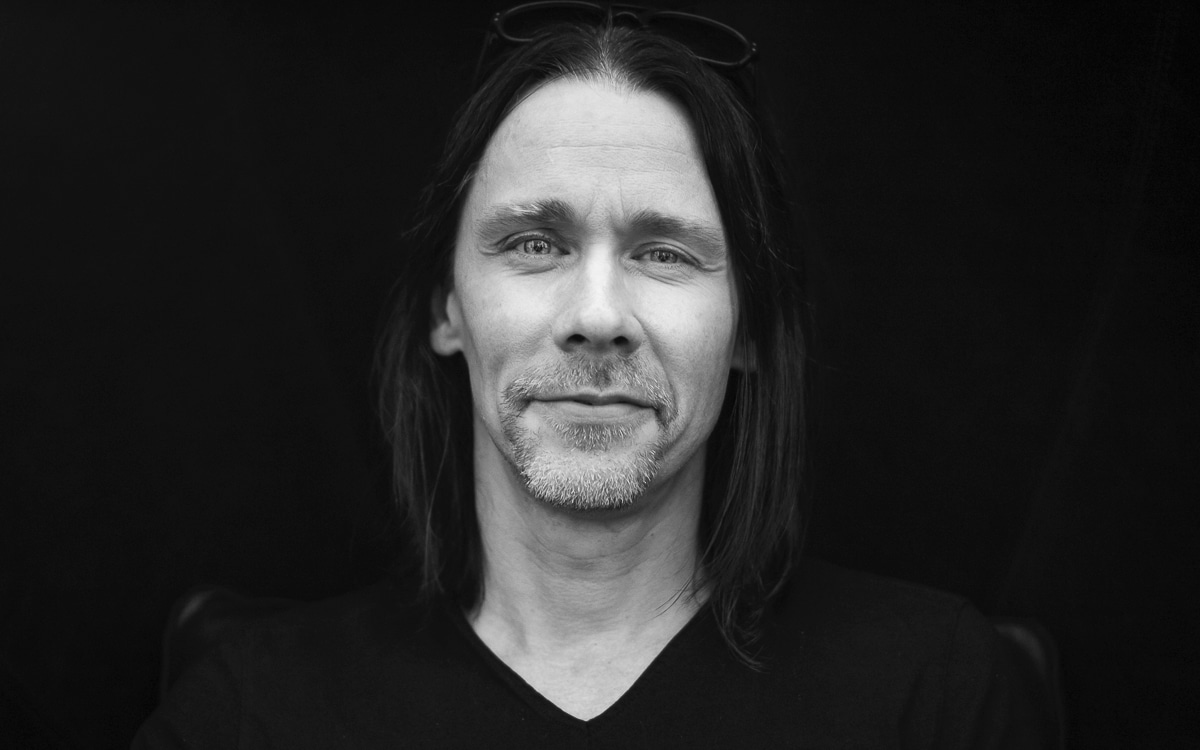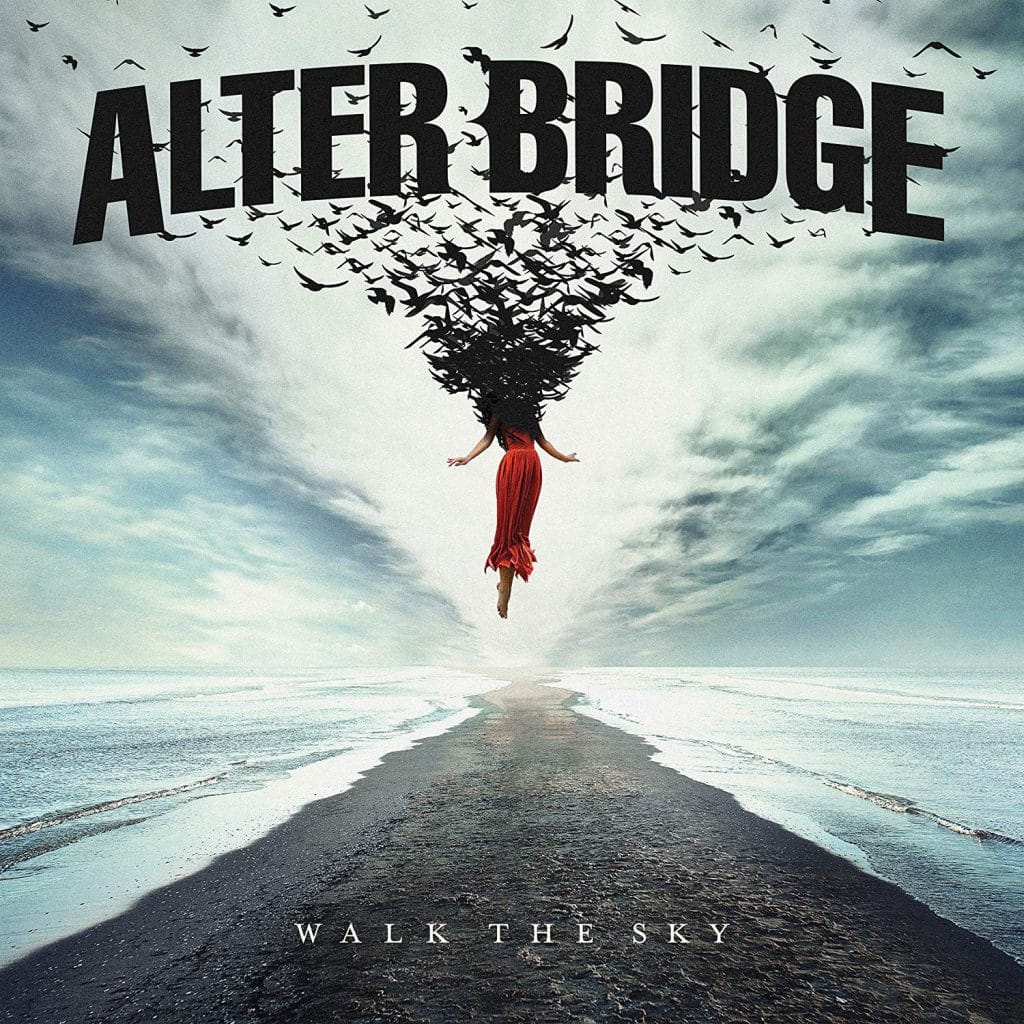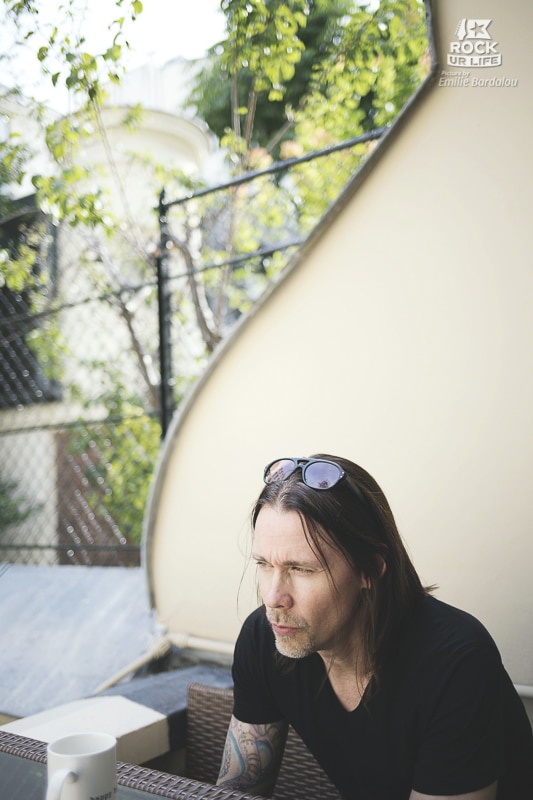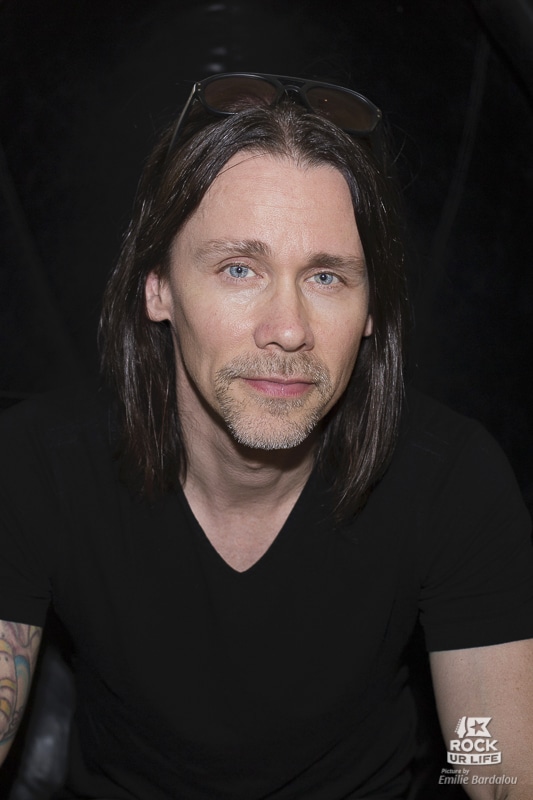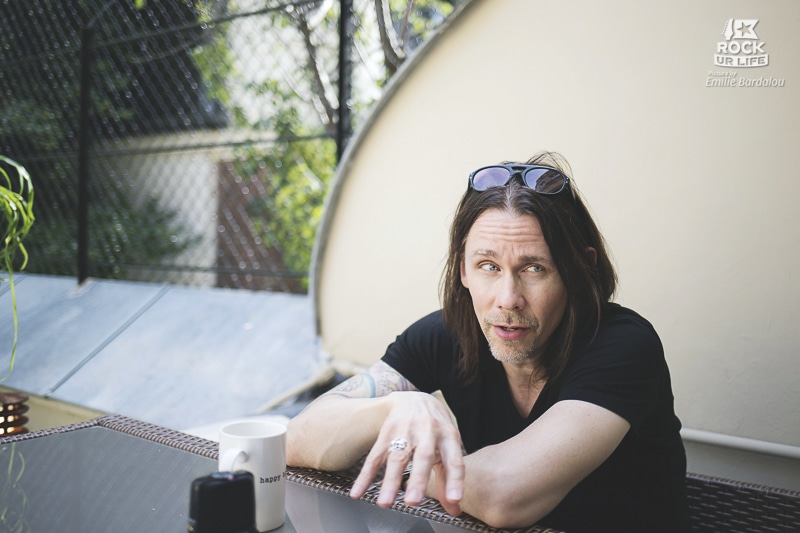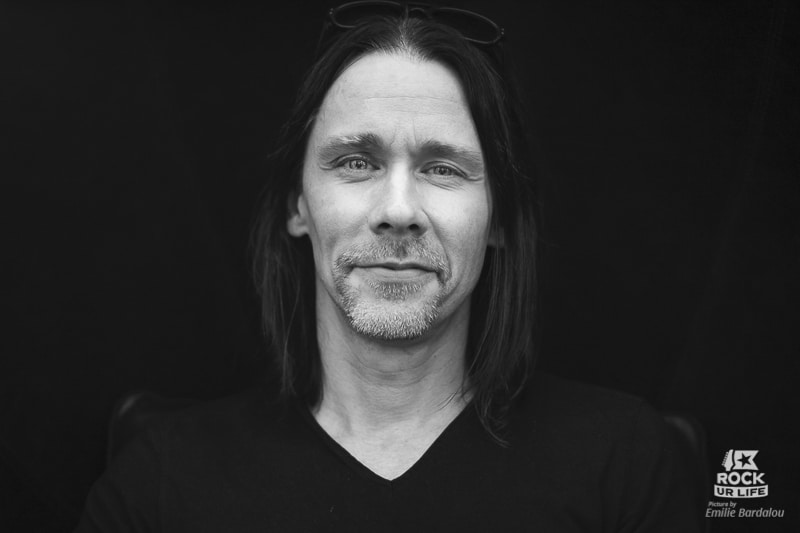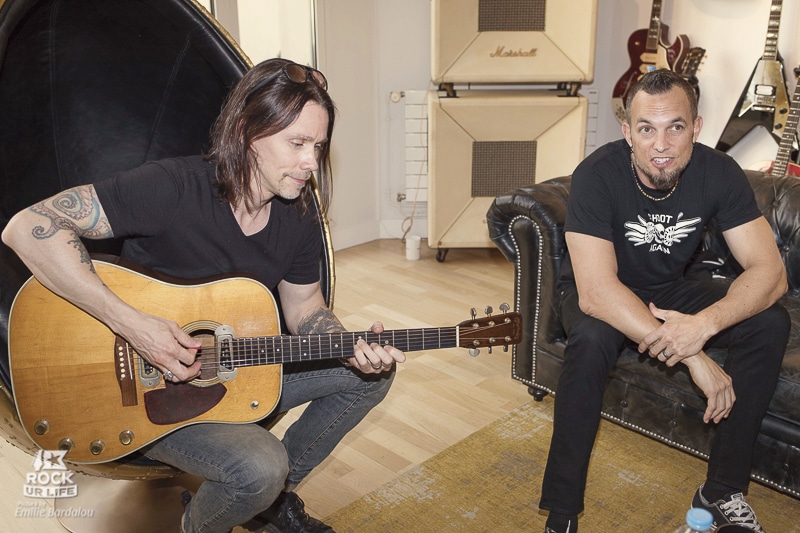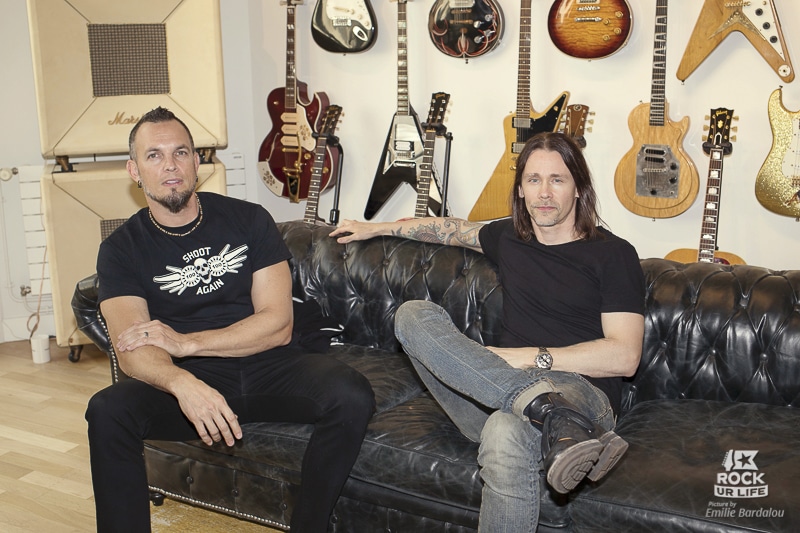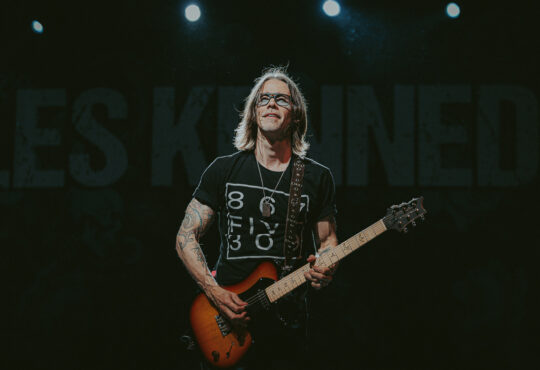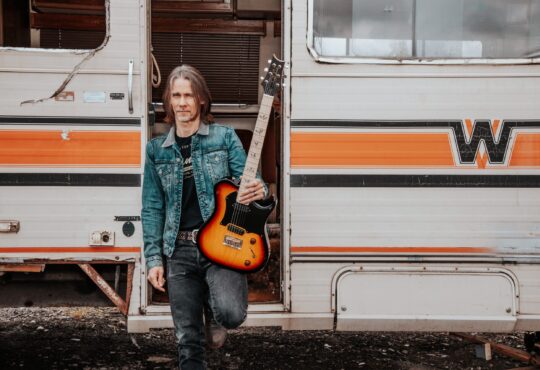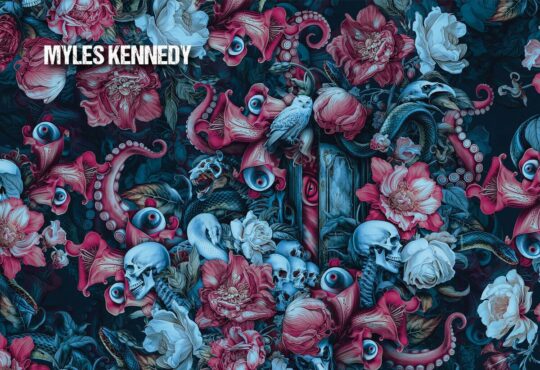Hard to wait a new record from Alter Bridge. But hey, here is it! “Walk The Sky”, their brand new record is on the way and we got an absolute pleasure to chat with Myles Kennedy and discover a bit more their brand new songs!
Hi Myles, how are you? How are you going to manage your rest between the end of the promo and the tour’s start?
Myles Kennedy (vocals/guitar): I’m great! I’m gonna basically go home, I’ll spend one day, I’ll allow myself one day to play with my dog and maybe do stuff around the house, clean the roof and then I go to start rehearsing.
You define “Walk The Sky” as the follow up to “AB III” (2010) which was very dark. Obviously this one sounds clear and positive. But why opposing it to “AB III”? Lyrics are still serious and not always fun to go with.
Myles: This record there’s definitely an uplifting element. I think there was certain things I was struggling with, answers I was trying to find on “AB III” and some of those questions I found answers, it’s working for me now. I wanted to express some of that on this record. But then you got songs like “Native Son” and a few others where it’s expressing different kinds of emotion. Mark also wrote a song for his friend, “Godspeed”, which is about loss. So yes, there’s still those pockets of emotion where we dive into this record.
The process was a bit different. You and Mark worked separately. How did you decide to work this way this time?
Myles: It was really just about the amount of time we really got. The fact that I was on the road non-stop between my solo project and Slash, we had Tremonti as well. There was nowhere we got the get in a room together. We just demoed the songs on our own and fortunately we landed on our feet. It could have gone horribly wrong. Initially we were a bit concerned, but it turned out great.
In which state of mind were you when thinking of this new Alter Bridge record?
Myles: In which state of mind? Other than being busy, I think because of the new philosophies and theories that were helping me, kinda piece together my existence, I felt a certain amount of peace. I think that helped me to create better. I wasn’t feeling down, just liberated and more focused, present. I think that you can really hear that on the record.
Without even comparing Mark’s and your input, the whole makes sense, tracks are flowing. Is there any guideline? Or is the connection mainly musical?
Myles: Yeah, I think that one of the connection is that we wanted to integrate a certain amount of textures from the eighties synths which we got a lot of influence from John Carpenter in particular, his old films and the spooky soundtracks. Also Mark discovered a band called Gunship, and incorporated some of that approach to the songs like “Pay No Mind”, “Godspeed”, “Clear Horizon”.
We hoped that some of those would be a thread sonically throw the record. You can also hear it on “In The Deep”, it’s stuck there somewhere. That song actually came from a loop I was messing with, trying to create something but at the end of the day I was like: “OK let just turn up the guitars”. (laughs) But subliminally, there’s a common thread out there. So I’m glad to hear you say that.
Isn’t it curious too that Mark’s and your separate work, still make sense?
Myles: It’s fascinating and we both scratch our heads to understand how this turn out the way it did. He keeps saying, bringing the story about our producer Elvis, at one point Elvis told Mark: “you know, I can’t tell which songs your wrote and Myles wrote, because you’re turning songs the way the other guy would” which is natural in a way. We’ve been playing together for over a decade. When we first played together, I was more of a classic rock, blues, jazz guy and he was more metal and modern rock. That’s also why the record sounds cohesive.
Did you work on some of his tracks and he, on yours? How was that like?
Myles: There was some songs like “Godspeed” he had, we made little changes here and there, on the demo he did. But there’s also tracks like “Native Son” I had the intro riff, verse and chorus but then when I got to the bridge, I felt it needed to go somewhere that I couldn’t hear anything so. Then Mark came in and had a really cool part, fitting perfectly. In “Dying Light”, Mark had this great intro, verse and chorus. I twicked the chorus and had a bridge idea and we made it. 20% of the record was made that way but for the 80%, we had pretty much complete songs.
Mark used and worked with sounds and samples and some are on the record, and that’s pretty interesting. What was your reaction when he showed those? Did you tend to try stuff like that too?
Myles: I was doing the same thing. We kind of had a game plan. We started to get a lot of the songs on our cloud and I was like: “yeah we definitely going down this road” with the keyboards and hopefully the fans are gonna like this because we’re jumping of the deep end here.
What about the live aspect of it? With all those sounds and guitars.
Myles: We gotta figure that one out because we have those theories with possibly guitar techs playing the keyboards parts but have you heard any guitar techs playing keyboard? (laughs) I haven’t, so we’ll see. It could be great or a complete disaster. I don’t know how we’ll do this. (laughs) Do you play keyboard? (laughs)
What about Elvis’ part in that? Those new inputs being in the studio.
Myles: Both him and his assistant, Jeff, were, I would say, 90% responsible. Mark and I had ideas we wanted to incorporate but Elvis really brought it. He has a really good understanding of polyphonic synths and all of that stuff, which wouldn’t sound like a couple of guitar hacks. It was cool because Jeff was part of that Nine Inch Nails scene back in the day, so he had a real understanding too. So I did templates Midi wise on my computer and then we would end up using them in conjunction with other sounds but it’s sticking to that Midi template.
But was Elvis surprised at first?
Myles: He might have been surprised and excited to try something new. He’s just very good, he’s a chameleon, he can do so many different things. That’s probably the challenge for him.
The whole album is very cinematic. You used a lot of flanger, chorus effects plus the additional guitars too. We kinda feel elevated, over the world. Is that what you were looking for?
Myles: Elevated, yeah. I think that goes back to that sense of elation to suddenly have better understanding and grasp of how you navigate being a human. And I think that “Walk The Sky” definitely sums that up beautifully, that whole phrase. Even the album cover we have. It’s almost enlightenment. I’m glad to hear that it’s an uplifting element you hear as listeners.
What about the album title? There’s the track “Walking On The Sky” and the record title “Walk The Sky”.
Myles: Yeah it was from the track. Actually when we were trying to come up with titles, and there’s on line in there, everybody really liked that and it also felt like something about a lot of the album’s themes, it make total sense. Even if the song is about a tightrope walker, the rush that people get when people do these extreme things and how they really feel alive when they kind of put their life on the line. Have you seen that movie “Free Solo” (2018)? The guy climbs all these rocks without any sort of harness. You gotta see it, it’s amazing. It highlights that rush, pushing their lives to the absolute extreme. That’s what that song is about.
Mark sings the lead on “Forever Falling” but we were surprised that’s not the case on “Godspeed”, which is about one of his friends who passed. How did you manage that? Did he want to sing on more? I expected that.
Myles: He never came up about “Godspeed”. I actually was the person who initially wanted him to sing on all of “Forever Falling”. It sounds like a Mark-song. With “Godspeed”, I felt like something vocally was in my will house, so it made sense to sing it. But for “Forever Falling” I was like: “Mark should sing that song!”. It finally happened and he was down with it. We hadn’t done that since the “Fortress” (2013) record with “Waters Rising” and I love it. A lot of the bands we listened to growing up did that like Jerry Cantrell doing a lot of the vocals with Layne Staley.
What was the most challenging here?
Myles: I would say probably demoing our stuff on our own. When you spend all this time. I mean some of these songs we put in dozens and dozens of hours, chasing them down and not knowing if it’s gonna be any good. The only person I’d have is my wife and she’ll only say: “oh I like that” or “I don’t like that one” but I didn’t have any of my bros. What I think, during my solo record, I really learnt to trust my instincts a lot more. I didn’t since The Mayfield Four days. It’s hard to commit because you have to come up with the guitar parts, the melodies, the lyrics. You gotta track it and it’s a time consuming thing and then you have to gig the next two hours with Slash. (laughs) I would literally get to the venue, set up my stuff and start doing demos and: “hey it’s show time in 30 minutes” and I’m out of this. (laughs) It’s just wearing a lot of hats all the time.
What were Brian and Scott’s reactions when you showed them the new material? What were their inputs to it?
Myles: I honestly don’t know what their initial thoughts were. The only person I heard from when I put my demos up, was Elvis. He’d be like: “this is good, this isn’t good”. The only time they started to weight in was when we were all in the same room together, working on the arrangements. We had like about nine days. Scott would joke around because he didn’t liked my drum programming: “but dude, you can do whatever you want”. (laughs)
What about “Clear Horizon”. We really liked that one, what’s the message/idea here?
Myles: I think it kind of falls in line, a little bit, with “Wouldn’t You Rather”. “Wouldn’t You Rather” is about following your bliss, doing what you love regardless of any material gains. In Western world, there’s so much emphasis put on accumulating things, doing things for the almighty dollar and not for your own happiness and not things that are for lack of a better world. I wouldn’t say more pure but with the goal being happiness. I think that both “Wouldn’t You Rather” and “Clear Horizon” discuss that whole concept of how do you navigate in this world, doing things from the heart, just because you want to do it.
The last track “Dying Light” is a really peaceful song and ending, aerial too. Do you agree?
Myles: Yeah. I think that’s why we chose it to close the record. It’s certainly the most Alter Bridge track in the way we arrange a song because it was definitely a song that evolved once we were all in the room together. It was written very similar to “Blackbird”. We’re very proud of it for that. But yeah, I think that this feeling is a great way to bookmark this album also with the “One Life” intro, it makes sense.
How would you define a good song? Is it a good chorus at first?
Myles: It depends who you ask that question. Some bands don’t really care about the chorus. The new Tool album is a great example. I love it, it’s amazing but it’s about the journey. Then you have a band like Alter Bridge who are more into riff, as a common thing, a melody where people can navigate towards and then a universal lyric. But the chorus is pretty important for us. We have a joke within the band it’s: “don’t bore us, get to the chorus”. (laughs) It’s a big one for us, for sure.
Did you have the same approach for your solo record?
Myles: No. For the solo record, it was great because it threw the “don’t bore us, get us to the chorus” thing, out of the window. I didn’t want to worry about writing big choruses, I wanted it to be more intimate and more about the lyrics. It just didn’t felt right to have big choruses at that point.
So you want to make a second solo record?
Myles: I hope so! I’d love to. It was maybe the most musically gratifying thing for me and I’ll tell you why: because I gotta play a lot of guitar. I love playing the guitar, it’s my first love. But I like singing too!
Do you remember your solo show in Paris?
Myles: How can’t I forget?! It was like a thousand degrees, it was so hot! But it was fun! People are so great here, I love playing here. I think about that gig a lot, I felt bad for you, like everyone was dying because of the heat. (laughs)
How could you sum up the record for the fans?
Myles: Definitely an Alter Bridge record. The parts of the equation here are still there, the element of melody, riff and lyrics that people will relate to. But, at the same time, we try to really get new sounds and arrangements. We also have an epic song at the end, we’ll leave that one for the die-hard fans and on the top of that, we have an optimistic approach with themes of liberation and enlightenment.
And finally we’re “RockUrLife”, so what rocks Myles Kennedy?
Myles: What rocks my life? My wife rocks my life! I love my wife, she’s rad! (laughs)
Website: www.alterbridge.com



